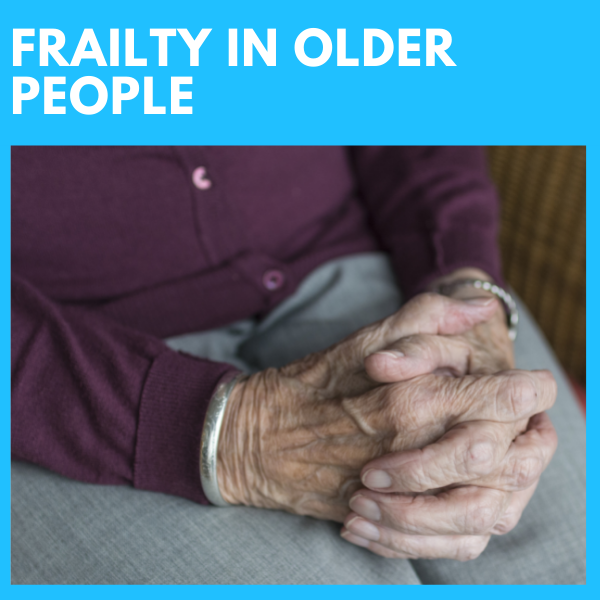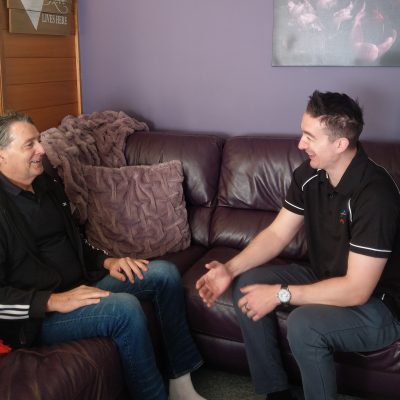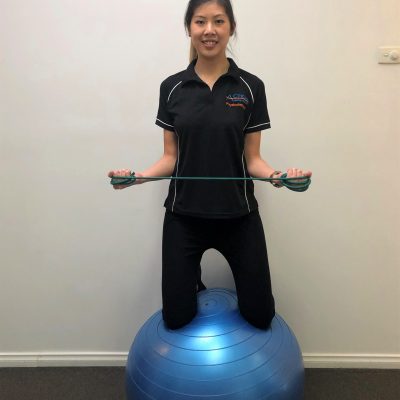Frailty is an ageing-related syndrome in which multiple physiological processes decline. This can lead to adverse health outcomes in older people. These outcomes include injury, reduced function, hospitalisations, admission to residential aged care and mortality. There is also overall poorer quality of life and wellbeing.
Currently, 1 in 7 Australians are over the age of 65 years, therefore continued good health as we age is becoming increasingly important.
Physiotherapists are in a perfect position to identify those at risk of frailty, assist to prevent onset, reduce severity of established frailty and promote healthy ageing at all stages of life.
Frailty is not inevitable
Frailty is common but it is not a guaranteed consequence of ageing. However, it is important to understand that the effects of frailty can be reversed.
Screening and assessment of frailty is important in older people
Physiotherapists can identify people who may have frailty. Early identification of frailty is key to its management and can therefore help to reduce adverse effects and improve outcomes.
Frailty screening can be started by a physiotherapist using a quick screen that includes gait speed, four metre and 10 metre walk tests, Timed Up and Go and grip strength.
Referral for a full multidisciplinary geriatric assessment is then recommended that includes:
- physical
- functional
- mobility and balance
- psychological
- environmental
- social
- medication assessments.
Risk of falls and fractures related to falls is increased
Frailty is an independent risk factor for falls, falls-related fractures and reduced mobility. With frail older people being 1.2 to 3.6 more likely to fall, than non-frail people the need to prevent falls is a priority as we age. Falls are the leading cause of death from injury in those aged over 65 years. Falls prevention is critical in the frail older population.
Physiotherapists play an important role in falls prevention through education, exercise prescription and encouraging safe activity.
A marked improvement in quality of life can be achieved through increasing balance and strength and reducing the risk of falls.
Preventing frailty and promoting healthy ageing
Physiotherapists can support older people to stay active, healthy and independent. As a result, this can prevent frailty and avoid unnecessary harm.
Early identification of frailty with targeted strategies to manage the following deficits are essential:
- falls
- mobility
- physical inactivity
- polypharmacy
- lifestyle factors (eg, drinking, smoking and weight)
- social isolation
- cognitive changes
- psychological factors
- continence issues
- unstable health conditions
- service or system issues
- reduced participation in daily tasks
- impaired vision/hearing.
Physiotherapists have a direct impact on many of these deficits. Referral to the wider multidisciplinary team can also address some of these concerns.
Further progression of frailty can be prevented by regular re-assessments to identify changes in function.
Staying physical activity prevents and treats frailty
Exercise has been shown to improve overall cardiorespiratory function, muscle function, flexibility and functional ability in frail older people. Individual health concerns and targeted exercises should be considered when creating exercise programs to achieve each person’s goals.
The recommendation for exercise in frail older people is to start with low intensity to avoid risk of injury.
Overall guidelines for exercise include:
- resistance, aerobic, flexibility, balance/coordination with an emphasis on strength and balance training
- functional exercises as able
- individually tailored program related to client goals
- greater than 5–6 month duration
- 2–3 times a week – 45–60 minutes in total (30–45 minutes in moderate to severe frailty).
Consider putting measures in place to improve long-term adherence to an exercise program for older frail clients as compliance with exercise is often poor.
How Action Home Rehab physiotherapists support frailty in older people
Our physiotherapists do a comprehensive person-centred assessment and care planning when they first meet a new client. Through building relationships with their client they are able to look for the small and the meaningful things. This really makes a difference to the way they interact and treat their client. Above all their focus is on their client’s overall health, mental health, cardiovascular health, mobility and functional capacity. Ultimately, they are striving to help improve the client’s quality of life.
See the infographic on 5 facts about frailty from the Australian Physiotherapy Association





